Leadership and Management for Service Industries: Thomas Cook Report
VerifiedAdded on 2021/01/02
|16
|5121
|83
Report
AI Summary
This report provides a comprehensive analysis of leadership and management practices within the travel and tourism sector, using Thomas Cook as a primary case study. The report begins by assessing various classical management theories, such as bureaucratic theory, scientific management, and Fayol's theory of personnel management, and evaluates their application within Thomas Cook's operations in the UK. It then delves into the roles of leaders and explores different leadership styles, including autocratic, democratic, and transformational leadership, and their impact on the organization. The report further examines how these management and leadership styles are applied to manage changes related to digital technologies within the travel and tourism industry. The report also covers internal and external factors influencing management styles and structures, and explores the hard and soft skills essential for success in the tourism sector, along with future skill requirements. Finally, the report concludes with a comparison of change management strategies across different service sectors, providing valuable insights into effective leadership and management in a dynamic industry.
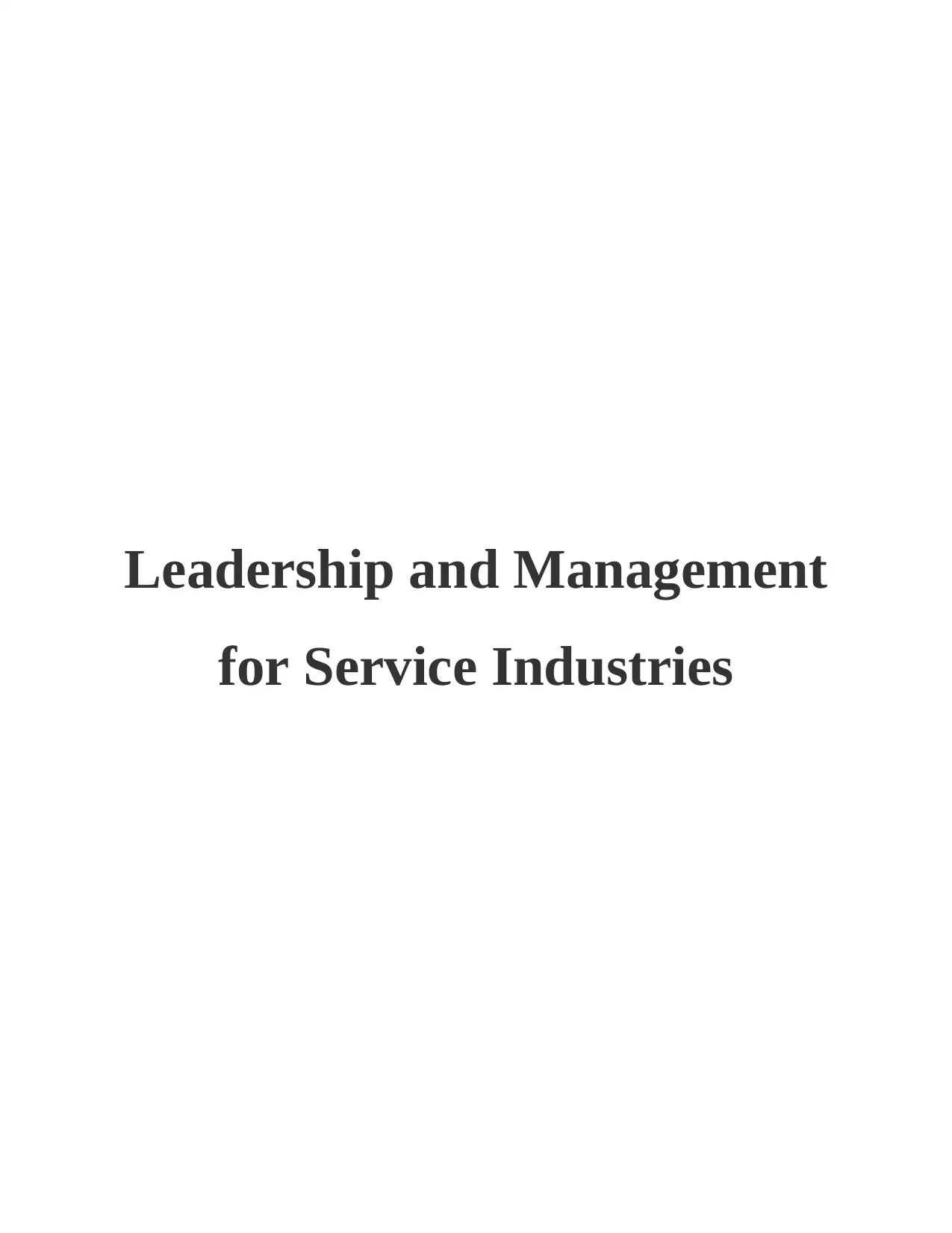
Leadership and Management
for Service Industries
for Service Industries
Paraphrase This Document
Need a fresh take? Get an instant paraphrase of this document with our AI Paraphraser
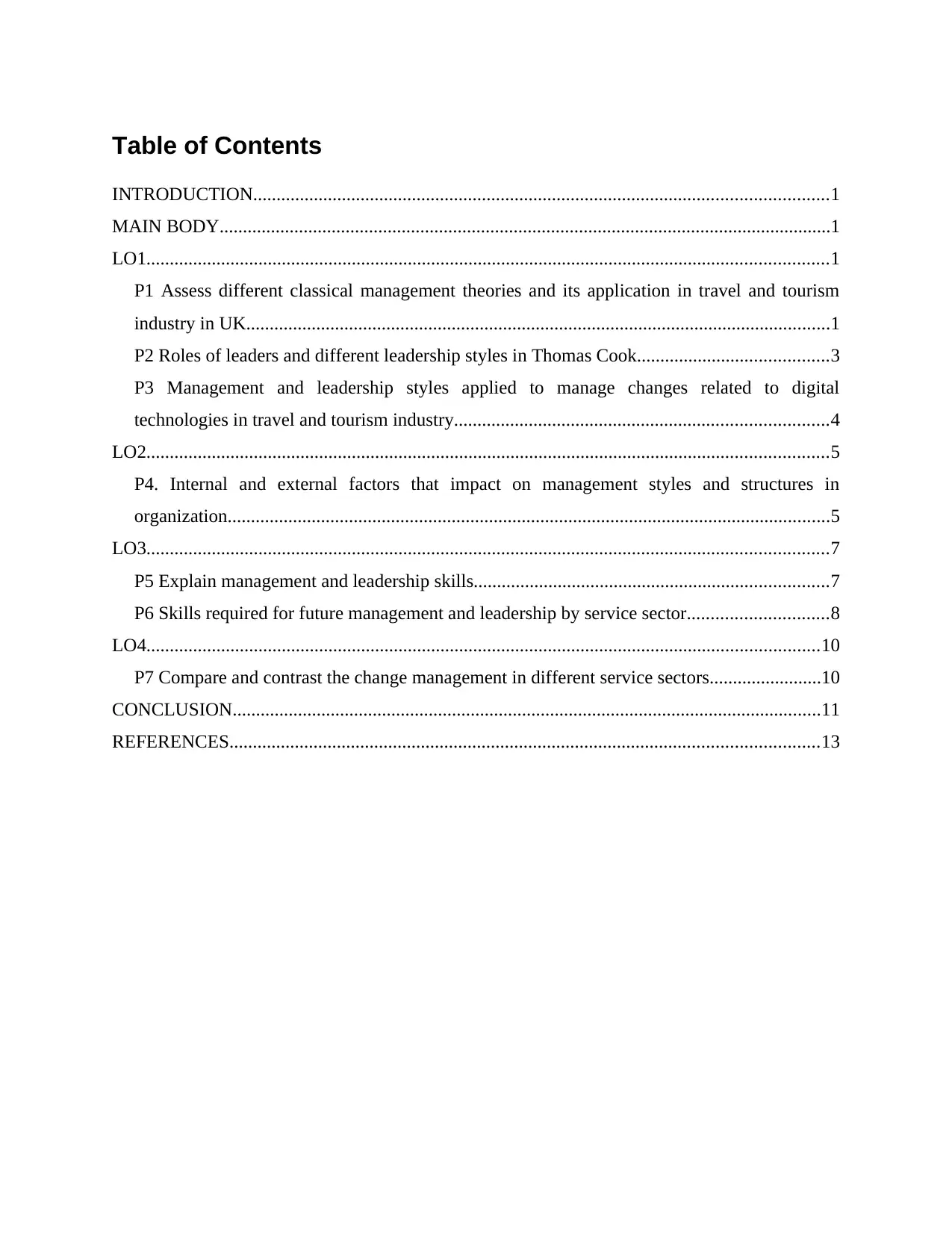
Table of Contents
INTRODUCTION...........................................................................................................................1
MAIN BODY...................................................................................................................................1
LO1..................................................................................................................................................1
P1 Assess different classical management theories and its application in travel and tourism
industry in UK.............................................................................................................................1
P2 Roles of leaders and different leadership styles in Thomas Cook.........................................3
P3 Management and leadership styles applied to manage changes related to digital
technologies in travel and tourism industry................................................................................4
LO2..................................................................................................................................................5
P4. Internal and external factors that impact on management styles and structures in
organization.................................................................................................................................5
LO3..................................................................................................................................................7
P5 Explain management and leadership skills............................................................................7
P6 Skills required for future management and leadership by service sector..............................8
LO4................................................................................................................................................10
P7 Compare and contrast the change management in different service sectors........................10
CONCLUSION..............................................................................................................................11
REFERENCES..............................................................................................................................13
INTRODUCTION...........................................................................................................................1
MAIN BODY...................................................................................................................................1
LO1..................................................................................................................................................1
P1 Assess different classical management theories and its application in travel and tourism
industry in UK.............................................................................................................................1
P2 Roles of leaders and different leadership styles in Thomas Cook.........................................3
P3 Management and leadership styles applied to manage changes related to digital
technologies in travel and tourism industry................................................................................4
LO2..................................................................................................................................................5
P4. Internal and external factors that impact on management styles and structures in
organization.................................................................................................................................5
LO3..................................................................................................................................................7
P5 Explain management and leadership skills............................................................................7
P6 Skills required for future management and leadership by service sector..............................8
LO4................................................................................................................................................10
P7 Compare and contrast the change management in different service sectors........................10
CONCLUSION..............................................................................................................................11
REFERENCES..............................................................................................................................13
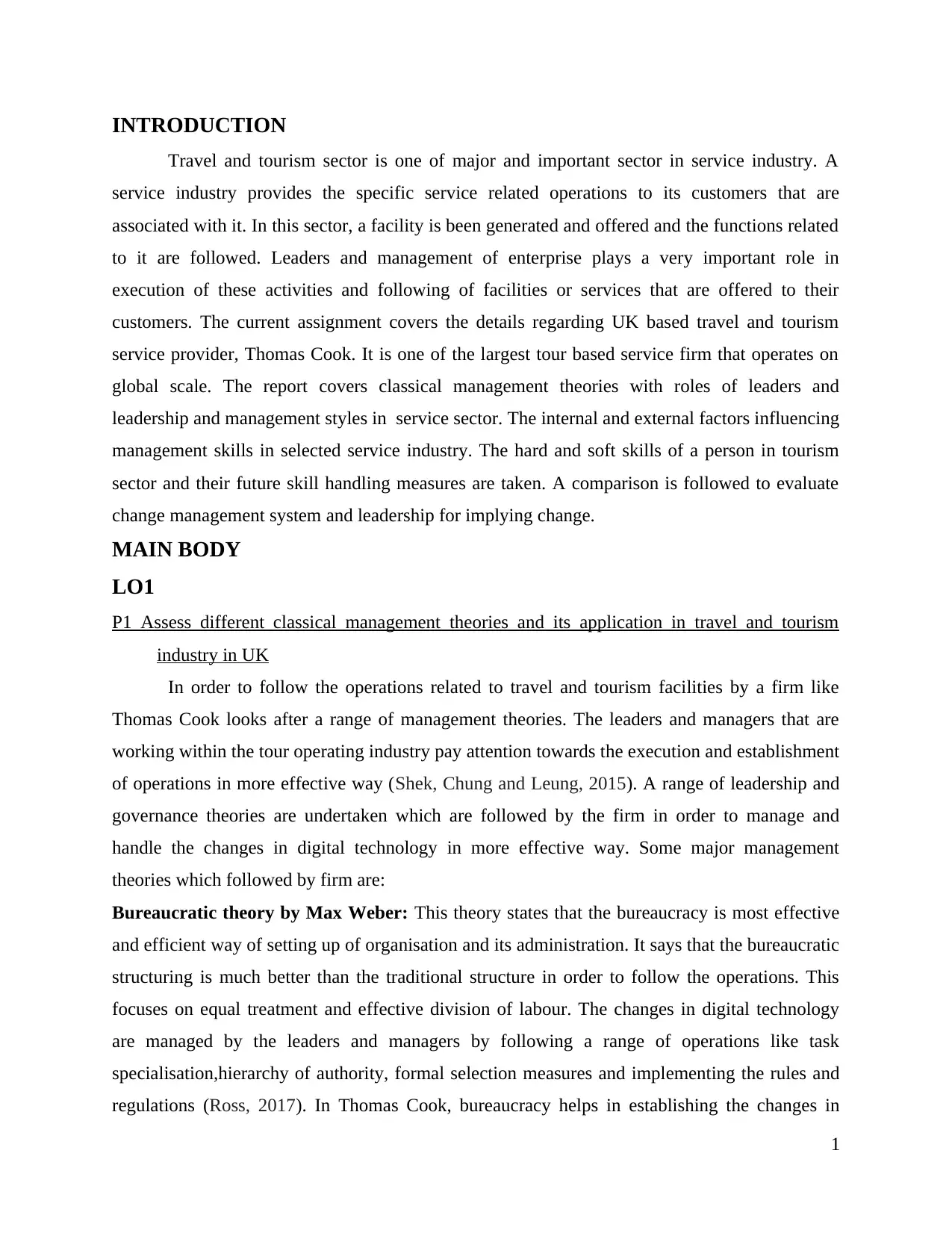
INTRODUCTION
Travel and tourism sector is one of major and important sector in service industry. A
service industry provides the specific service related operations to its customers that are
associated with it. In this sector, a facility is been generated and offered and the functions related
to it are followed. Leaders and management of enterprise plays a very important role in
execution of these activities and following of facilities or services that are offered to their
customers. The current assignment covers the details regarding UK based travel and tourism
service provider, Thomas Cook. It is one of the largest tour based service firm that operates on
global scale. The report covers classical management theories with roles of leaders and
leadership and management styles in service sector. The internal and external factors influencing
management skills in selected service industry. The hard and soft skills of a person in tourism
sector and their future skill handling measures are taken. A comparison is followed to evaluate
change management system and leadership for implying change.
MAIN BODY
LO1
P1 Assess different classical management theories and its application in travel and tourism
industry in UK
In order to follow the operations related to travel and tourism facilities by a firm like
Thomas Cook looks after a range of management theories. The leaders and managers that are
working within the tour operating industry pay attention towards the execution and establishment
of operations in more effective way (Shek, Chung and Leung, 2015). A range of leadership and
governance theories are undertaken which are followed by the firm in order to manage and
handle the changes in digital technology in more effective way. Some major management
theories which followed by firm are:
Bureaucratic theory by Max Weber: This theory states that the bureaucracy is most effective
and efficient way of setting up of organisation and its administration. It says that the bureaucratic
structuring is much better than the traditional structure in order to follow the operations. This
focuses on equal treatment and effective division of labour. The changes in digital technology
are managed by the leaders and managers by following a range of operations like task
specialisation,hierarchy of authority, formal selection measures and implementing the rules and
regulations (Ross, 2017). In Thomas Cook, bureaucracy helps in establishing the changes in
1
Travel and tourism sector is one of major and important sector in service industry. A
service industry provides the specific service related operations to its customers that are
associated with it. In this sector, a facility is been generated and offered and the functions related
to it are followed. Leaders and management of enterprise plays a very important role in
execution of these activities and following of facilities or services that are offered to their
customers. The current assignment covers the details regarding UK based travel and tourism
service provider, Thomas Cook. It is one of the largest tour based service firm that operates on
global scale. The report covers classical management theories with roles of leaders and
leadership and management styles in service sector. The internal and external factors influencing
management skills in selected service industry. The hard and soft skills of a person in tourism
sector and their future skill handling measures are taken. A comparison is followed to evaluate
change management system and leadership for implying change.
MAIN BODY
LO1
P1 Assess different classical management theories and its application in travel and tourism
industry in UK
In order to follow the operations related to travel and tourism facilities by a firm like
Thomas Cook looks after a range of management theories. The leaders and managers that are
working within the tour operating industry pay attention towards the execution and establishment
of operations in more effective way (Shek, Chung and Leung, 2015). A range of leadership and
governance theories are undertaken which are followed by the firm in order to manage and
handle the changes in digital technology in more effective way. Some major management
theories which followed by firm are:
Bureaucratic theory by Max Weber: This theory states that the bureaucracy is most effective
and efficient way of setting up of organisation and its administration. It says that the bureaucratic
structuring is much better than the traditional structure in order to follow the operations. This
focuses on equal treatment and effective division of labour. The changes in digital technology
are managed by the leaders and managers by following a range of operations like task
specialisation,hierarchy of authority, formal selection measures and implementing the rules and
regulations (Ross, 2017). In Thomas Cook, bureaucracy helps in establishing the changes in
1
⊘ This is a preview!⊘
Do you want full access?
Subscribe today to unlock all pages.

Trusted by 1+ million students worldwide
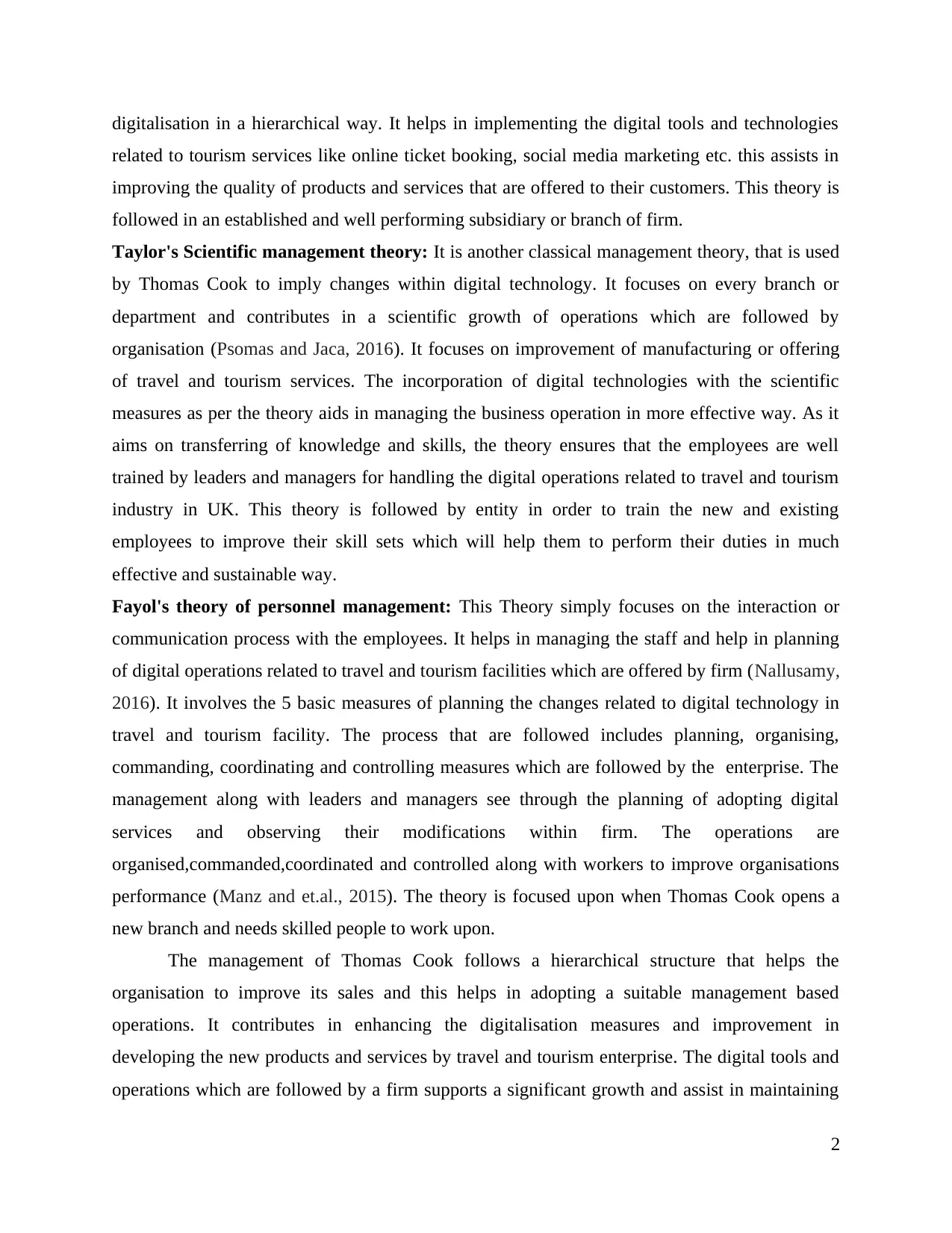
digitalisation in a hierarchical way. It helps in implementing the digital tools and technologies
related to tourism services like online ticket booking, social media marketing etc. this assists in
improving the quality of products and services that are offered to their customers. This theory is
followed in an established and well performing subsidiary or branch of firm.
Taylor's Scientific management theory: It is another classical management theory, that is used
by Thomas Cook to imply changes within digital technology. It focuses on every branch or
department and contributes in a scientific growth of operations which are followed by
organisation (Psomas and Jaca, 2016). It focuses on improvement of manufacturing or offering
of travel and tourism services. The incorporation of digital technologies with the scientific
measures as per the theory aids in managing the business operation in more effective way. As it
aims on transferring of knowledge and skills, the theory ensures that the employees are well
trained by leaders and managers for handling the digital operations related to travel and tourism
industry in UK. This theory is followed by entity in order to train the new and existing
employees to improve their skill sets which will help them to perform their duties in much
effective and sustainable way.
Fayol's theory of personnel management: This Theory simply focuses on the interaction or
communication process with the employees. It helps in managing the staff and help in planning
of digital operations related to travel and tourism facilities which are offered by firm (Nallusamy,
2016). It involves the 5 basic measures of planning the changes related to digital technology in
travel and tourism facility. The process that are followed includes planning, organising,
commanding, coordinating and controlling measures which are followed by the enterprise. The
management along with leaders and managers see through the planning of adopting digital
services and observing their modifications within firm. The operations are
organised,commanded,coordinated and controlled along with workers to improve organisations
performance (Manz and et.al., 2015). The theory is focused upon when Thomas Cook opens a
new branch and needs skilled people to work upon.
The management of Thomas Cook follows a hierarchical structure that helps the
organisation to improve its sales and this helps in adopting a suitable management based
operations. It contributes in enhancing the digitalisation measures and improvement in
developing the new products and services by travel and tourism enterprise. The digital tools and
operations which are followed by a firm supports a significant growth and assist in maintaining
2
related to tourism services like online ticket booking, social media marketing etc. this assists in
improving the quality of products and services that are offered to their customers. This theory is
followed in an established and well performing subsidiary or branch of firm.
Taylor's Scientific management theory: It is another classical management theory, that is used
by Thomas Cook to imply changes within digital technology. It focuses on every branch or
department and contributes in a scientific growth of operations which are followed by
organisation (Psomas and Jaca, 2016). It focuses on improvement of manufacturing or offering
of travel and tourism services. The incorporation of digital technologies with the scientific
measures as per the theory aids in managing the business operation in more effective way. As it
aims on transferring of knowledge and skills, the theory ensures that the employees are well
trained by leaders and managers for handling the digital operations related to travel and tourism
industry in UK. This theory is followed by entity in order to train the new and existing
employees to improve their skill sets which will help them to perform their duties in much
effective and sustainable way.
Fayol's theory of personnel management: This Theory simply focuses on the interaction or
communication process with the employees. It helps in managing the staff and help in planning
of digital operations related to travel and tourism facilities which are offered by firm (Nallusamy,
2016). It involves the 5 basic measures of planning the changes related to digital technology in
travel and tourism facility. The process that are followed includes planning, organising,
commanding, coordinating and controlling measures which are followed by the enterprise. The
management along with leaders and managers see through the planning of adopting digital
services and observing their modifications within firm. The operations are
organised,commanded,coordinated and controlled along with workers to improve organisations
performance (Manz and et.al., 2015). The theory is focused upon when Thomas Cook opens a
new branch and needs skilled people to work upon.
The management of Thomas Cook follows a hierarchical structure that helps the
organisation to improve its sales and this helps in adopting a suitable management based
operations. It contributes in enhancing the digitalisation measures and improvement in
developing the new products and services by travel and tourism enterprise. The digital tools and
operations which are followed by a firm supports a significant growth and assist in maintaining
2
Paraphrase This Document
Need a fresh take? Get an instant paraphrase of this document with our AI Paraphraser
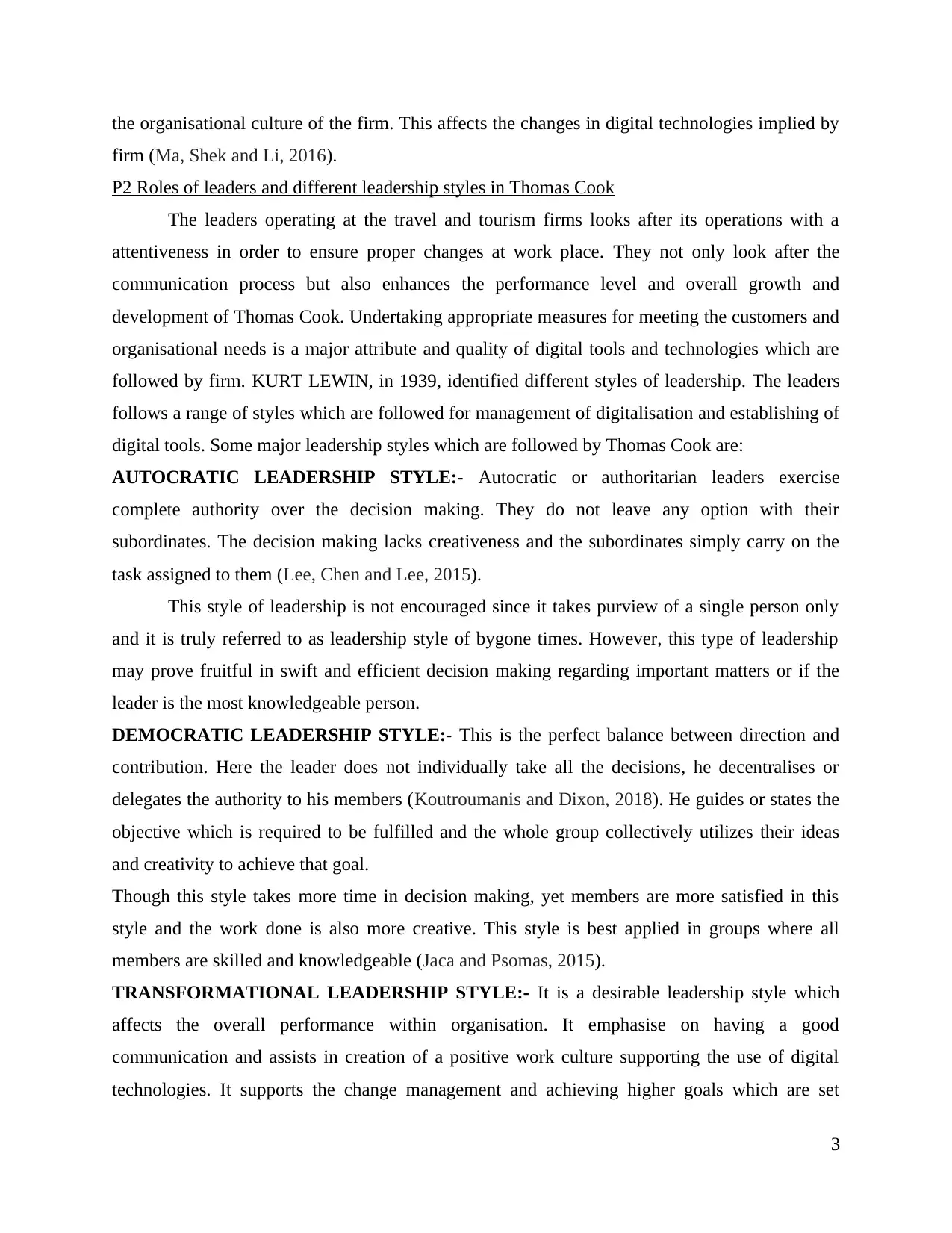
the organisational culture of the firm. This affects the changes in digital technologies implied by
firm (Ma, Shek and Li, 2016).
P2 Roles of leaders and different leadership styles in Thomas Cook
The leaders operating at the travel and tourism firms looks after its operations with a
attentiveness in order to ensure proper changes at work place. They not only look after the
communication process but also enhances the performance level and overall growth and
development of Thomas Cook. Undertaking appropriate measures for meeting the customers and
organisational needs is a major attribute and quality of digital tools and technologies which are
followed by firm. KURT LEWIN, in 1939, identified different styles of leadership. The leaders
follows a range of styles which are followed for management of digitalisation and establishing of
digital tools. Some major leadership styles which are followed by Thomas Cook are:
AUTOCRATIC LEADERSHIP STYLE:- Autocratic or authoritarian leaders exercise
complete authority over the decision making. They do not leave any option with their
subordinates. The decision making lacks creativeness and the subordinates simply carry on the
task assigned to them (Lee, Chen and Lee, 2015).
This style of leadership is not encouraged since it takes purview of a single person only
and it is truly referred to as leadership style of bygone times. However, this type of leadership
may prove fruitful in swift and efficient decision making regarding important matters or if the
leader is the most knowledgeable person.
DEMOCRATIC LEADERSHIP STYLE:- This is the perfect balance between direction and
contribution. Here the leader does not individually take all the decisions, he decentralises or
delegates the authority to his members (Koutroumanis and Dixon, 2018). He guides or states the
objective which is required to be fulfilled and the whole group collectively utilizes their ideas
and creativity to achieve that goal.
Though this style takes more time in decision making, yet members are more satisfied in this
style and the work done is also more creative. This style is best applied in groups where all
members are skilled and knowledgeable (Jaca and Psomas, 2015).
TRANSFORMATIONAL LEADERSHIP STYLE:- It is a desirable leadership style which
affects the overall performance within organisation. It emphasise on having a good
communication and assists in creation of a positive work culture supporting the use of digital
technologies. It supports the change management and achieving higher goals which are set
3
firm (Ma, Shek and Li, 2016).
P2 Roles of leaders and different leadership styles in Thomas Cook
The leaders operating at the travel and tourism firms looks after its operations with a
attentiveness in order to ensure proper changes at work place. They not only look after the
communication process but also enhances the performance level and overall growth and
development of Thomas Cook. Undertaking appropriate measures for meeting the customers and
organisational needs is a major attribute and quality of digital tools and technologies which are
followed by firm. KURT LEWIN, in 1939, identified different styles of leadership. The leaders
follows a range of styles which are followed for management of digitalisation and establishing of
digital tools. Some major leadership styles which are followed by Thomas Cook are:
AUTOCRATIC LEADERSHIP STYLE:- Autocratic or authoritarian leaders exercise
complete authority over the decision making. They do not leave any option with their
subordinates. The decision making lacks creativeness and the subordinates simply carry on the
task assigned to them (Lee, Chen and Lee, 2015).
This style of leadership is not encouraged since it takes purview of a single person only
and it is truly referred to as leadership style of bygone times. However, this type of leadership
may prove fruitful in swift and efficient decision making regarding important matters or if the
leader is the most knowledgeable person.
DEMOCRATIC LEADERSHIP STYLE:- This is the perfect balance between direction and
contribution. Here the leader does not individually take all the decisions, he decentralises or
delegates the authority to his members (Koutroumanis and Dixon, 2018). He guides or states the
objective which is required to be fulfilled and the whole group collectively utilizes their ideas
and creativity to achieve that goal.
Though this style takes more time in decision making, yet members are more satisfied in this
style and the work done is also more creative. This style is best applied in groups where all
members are skilled and knowledgeable (Jaca and Psomas, 2015).
TRANSFORMATIONAL LEADERSHIP STYLE:- It is a desirable leadership style which
affects the overall performance within organisation. It emphasise on having a good
communication and assists in creation of a positive work culture supporting the use of digital
technologies. It supports the change management and achieving higher goals which are set
3
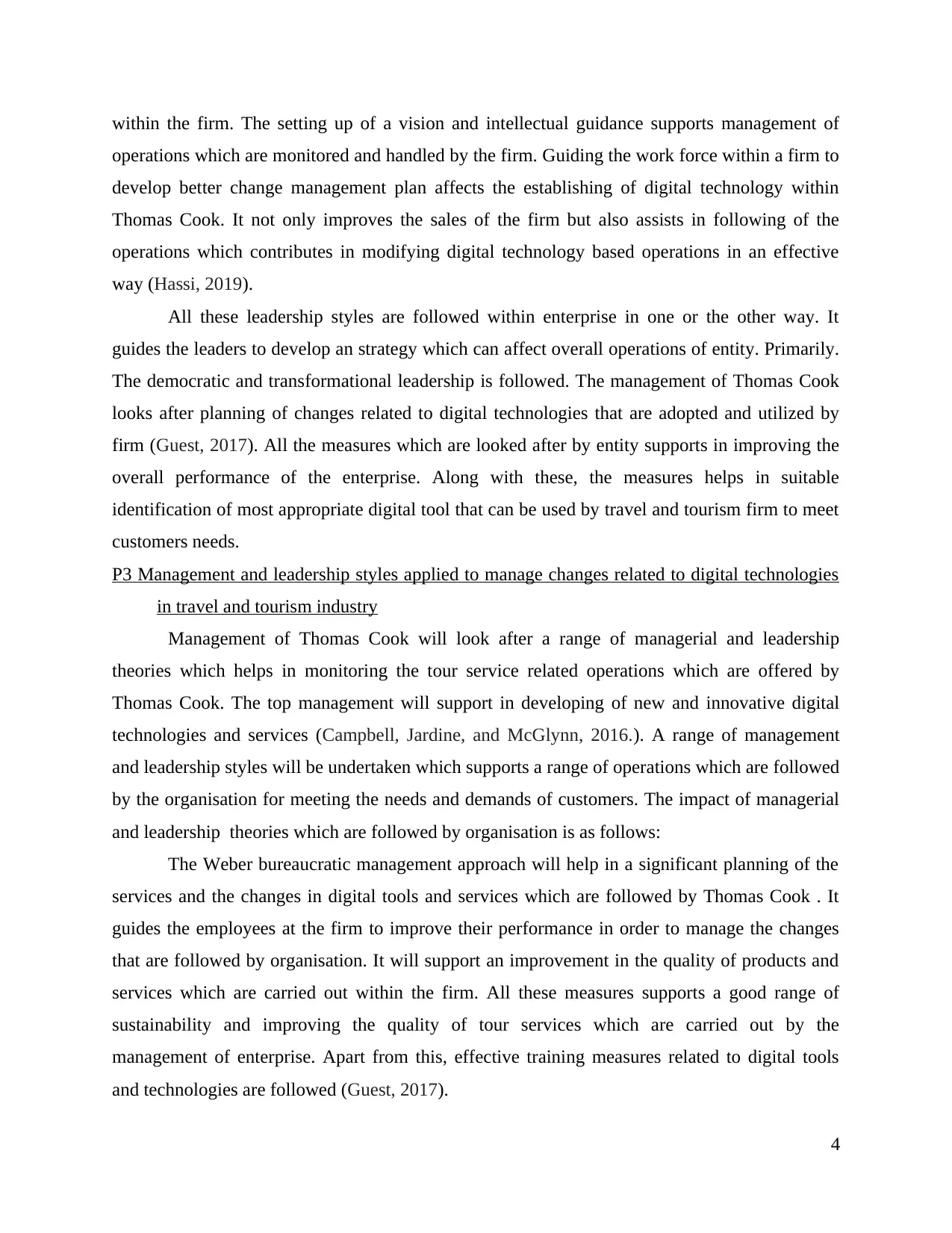
within the firm. The setting up of a vision and intellectual guidance supports management of
operations which are monitored and handled by the firm. Guiding the work force within a firm to
develop better change management plan affects the establishing of digital technology within
Thomas Cook. It not only improves the sales of the firm but also assists in following of the
operations which contributes in modifying digital technology based operations in an effective
way (Hassi, 2019).
All these leadership styles are followed within enterprise in one or the other way. It
guides the leaders to develop an strategy which can affect overall operations of entity. Primarily.
The democratic and transformational leadership is followed. The management of Thomas Cook
looks after planning of changes related to digital technologies that are adopted and utilized by
firm (Guest, 2017). All the measures which are looked after by entity supports in improving the
overall performance of the enterprise. Along with these, the measures helps in suitable
identification of most appropriate digital tool that can be used by travel and tourism firm to meet
customers needs.
P3 Management and leadership styles applied to manage changes related to digital technologies
in travel and tourism industry
Management of Thomas Cook will look after a range of managerial and leadership
theories which helps in monitoring the tour service related operations which are offered by
Thomas Cook. The top management will support in developing of new and innovative digital
technologies and services (Campbell, Jardine, and McGlynn, 2016.). A range of management
and leadership styles will be undertaken which supports a range of operations which are followed
by the organisation for meeting the needs and demands of customers. The impact of managerial
and leadership theories which are followed by organisation is as follows:
The Weber bureaucratic management approach will help in a significant planning of the
services and the changes in digital tools and services which are followed by Thomas Cook . It
guides the employees at the firm to improve their performance in order to manage the changes
that are followed by organisation. It will support an improvement in the quality of products and
services which are carried out within the firm. All these measures supports a good range of
sustainability and improving the quality of tour services which are carried out by the
management of enterprise. Apart from this, effective training measures related to digital tools
and technologies are followed (Guest, 2017).
4
operations which are monitored and handled by the firm. Guiding the work force within a firm to
develop better change management plan affects the establishing of digital technology within
Thomas Cook. It not only improves the sales of the firm but also assists in following of the
operations which contributes in modifying digital technology based operations in an effective
way (Hassi, 2019).
All these leadership styles are followed within enterprise in one or the other way. It
guides the leaders to develop an strategy which can affect overall operations of entity. Primarily.
The democratic and transformational leadership is followed. The management of Thomas Cook
looks after planning of changes related to digital technologies that are adopted and utilized by
firm (Guest, 2017). All the measures which are looked after by entity supports in improving the
overall performance of the enterprise. Along with these, the measures helps in suitable
identification of most appropriate digital tool that can be used by travel and tourism firm to meet
customers needs.
P3 Management and leadership styles applied to manage changes related to digital technologies
in travel and tourism industry
Management of Thomas Cook will look after a range of managerial and leadership
theories which helps in monitoring the tour service related operations which are offered by
Thomas Cook. The top management will support in developing of new and innovative digital
technologies and services (Campbell, Jardine, and McGlynn, 2016.). A range of management
and leadership styles will be undertaken which supports a range of operations which are followed
by the organisation for meeting the needs and demands of customers. The impact of managerial
and leadership theories which are followed by organisation is as follows:
The Weber bureaucratic management approach will help in a significant planning of the
services and the changes in digital tools and services which are followed by Thomas Cook . It
guides the employees at the firm to improve their performance in order to manage the changes
that are followed by organisation. It will support an improvement in the quality of products and
services which are carried out within the firm. All these measures supports a good range of
sustainability and improving the quality of tour services which are carried out by the
management of enterprise. Apart from this, effective training measures related to digital tools
and technologies are followed (Guest, 2017).
4
⊘ This is a preview!⊘
Do you want full access?
Subscribe today to unlock all pages.

Trusted by 1+ million students worldwide
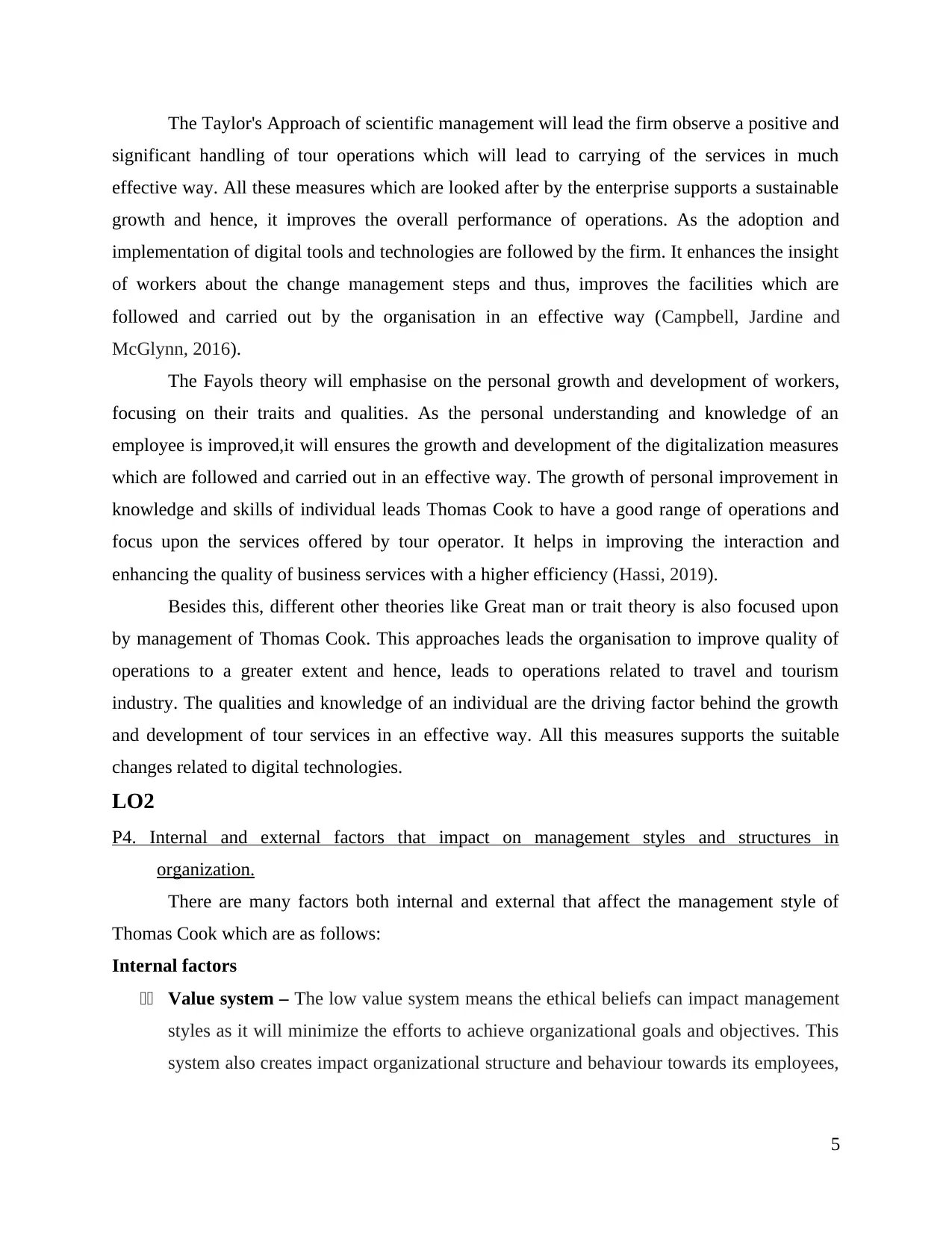
The Taylor's Approach of scientific management will lead the firm observe a positive and
significant handling of tour operations which will lead to carrying of the services in much
effective way. All these measures which are looked after by the enterprise supports a sustainable
growth and hence, it improves the overall performance of operations. As the adoption and
implementation of digital tools and technologies are followed by the firm. It enhances the insight
of workers about the change management steps and thus, improves the facilities which are
followed and carried out by the organisation in an effective way (Campbell, Jardine and
McGlynn, 2016).
The Fayols theory will emphasise on the personal growth and development of workers,
focusing on their traits and qualities. As the personal understanding and knowledge of an
employee is improved,it will ensures the growth and development of the digitalization measures
which are followed and carried out in an effective way. The growth of personal improvement in
knowledge and skills of individual leads Thomas Cook to have a good range of operations and
focus upon the services offered by tour operator. It helps in improving the interaction and
enhancing the quality of business services with a higher efficiency (Hassi, 2019).
Besides this, different other theories like Great man or trait theory is also focused upon
by management of Thomas Cook. This approaches leads the organisation to improve quality of
operations to a greater extent and hence, leads to operations related to travel and tourism
industry. The qualities and knowledge of an individual are the driving factor behind the growth
and development of tour services in an effective way. All this measures supports the suitable
changes related to digital technologies.
LO2
P4. Internal and external factors that impact on management styles and structures in
organization.
There are many factors both internal and external that affect the management style of
Thomas Cook which are as follows:
Internal factors
11 Value system – The low value system means the ethical beliefs can impact management
styles as it will minimize the efforts to achieve organizational goals and objectives. This
system also creates impact organizational structure and behaviour towards its employees,
5
significant handling of tour operations which will lead to carrying of the services in much
effective way. All these measures which are looked after by the enterprise supports a sustainable
growth and hence, it improves the overall performance of operations. As the adoption and
implementation of digital tools and technologies are followed by the firm. It enhances the insight
of workers about the change management steps and thus, improves the facilities which are
followed and carried out by the organisation in an effective way (Campbell, Jardine and
McGlynn, 2016).
The Fayols theory will emphasise on the personal growth and development of workers,
focusing on their traits and qualities. As the personal understanding and knowledge of an
employee is improved,it will ensures the growth and development of the digitalization measures
which are followed and carried out in an effective way. The growth of personal improvement in
knowledge and skills of individual leads Thomas Cook to have a good range of operations and
focus upon the services offered by tour operator. It helps in improving the interaction and
enhancing the quality of business services with a higher efficiency (Hassi, 2019).
Besides this, different other theories like Great man or trait theory is also focused upon
by management of Thomas Cook. This approaches leads the organisation to improve quality of
operations to a greater extent and hence, leads to operations related to travel and tourism
industry. The qualities and knowledge of an individual are the driving factor behind the growth
and development of tour services in an effective way. All this measures supports the suitable
changes related to digital technologies.
LO2
P4. Internal and external factors that impact on management styles and structures in
organization.
There are many factors both internal and external that affect the management style of
Thomas Cook which are as follows:
Internal factors
11 Value system – The low value system means the ethical beliefs can impact management
styles as it will minimize the efforts to achieve organizational goals and objectives. This
system also creates impact organizational structure and behaviour towards its employees,
5
Paraphrase This Document
Need a fresh take? Get an instant paraphrase of this document with our AI Paraphraser
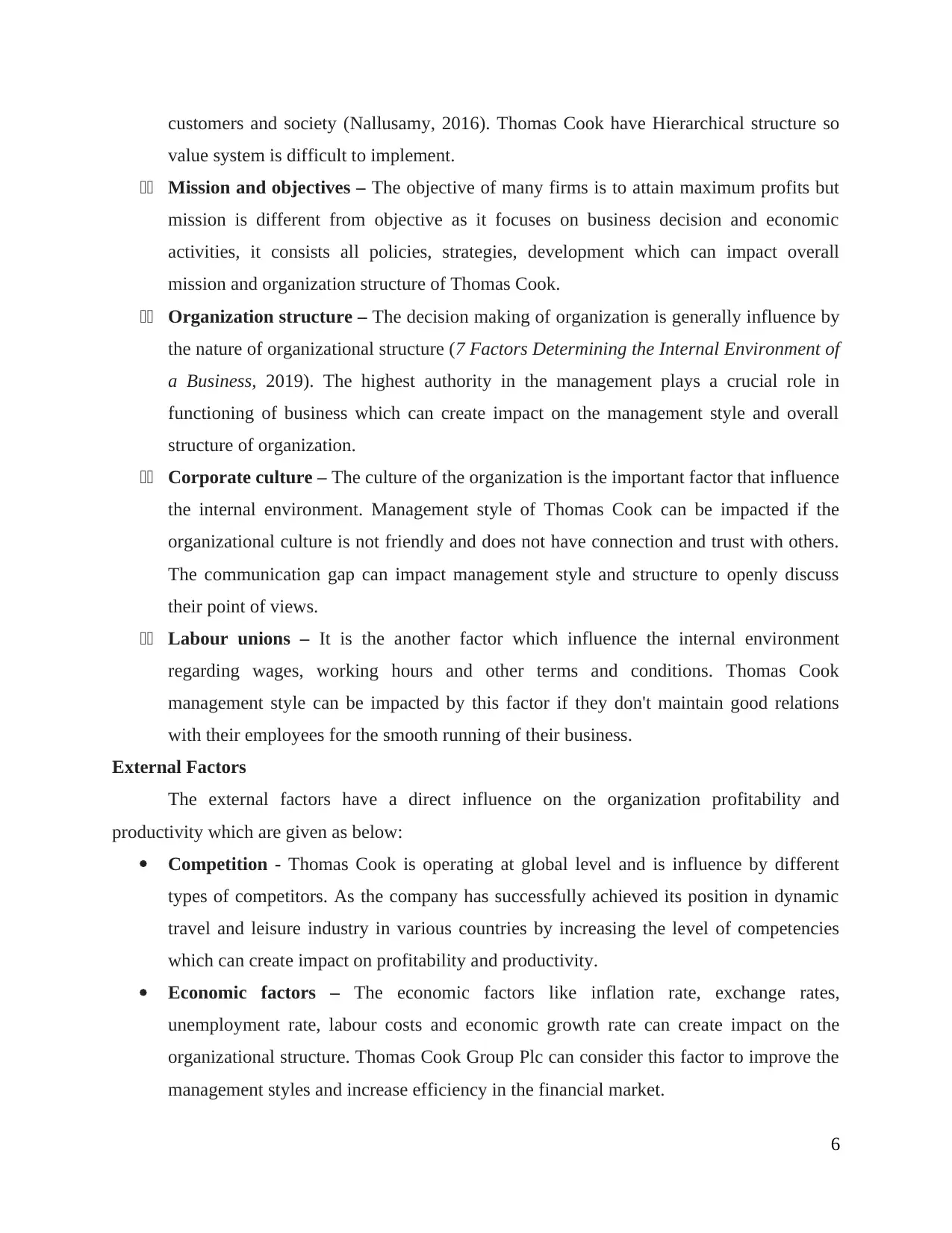
customers and society (Nallusamy, 2016). Thomas Cook have Hierarchical structure so
value system is difficult to implement.
11 Mission and objectives – The objective of many firms is to attain maximum profits but
mission is different from objective as it focuses on business decision and economic
activities, it consists all policies, strategies, development which can impact overall
mission and organization structure of Thomas Cook.
11 Organization structure – The decision making of organization is generally influence by
the nature of organizational structure (7 Factors Determining the Internal Environment of
a Business, 2019). The highest authority in the management plays a crucial role in
functioning of business which can create impact on the management style and overall
structure of organization.
11 Corporate culture – The culture of the organization is the important factor that influence
the internal environment. Management style of Thomas Cook can be impacted if the
organizational culture is not friendly and does not have connection and trust with others.
The communication gap can impact management style and structure to openly discuss
their point of views.
11 Labour unions – It is the another factor which influence the internal environment
regarding wages, working hours and other terms and conditions. Thomas Cook
management style can be impacted by this factor if they don't maintain good relations
with their employees for the smooth running of their business.
External Factors
The external factors have a direct influence on the organization profitability and
productivity which are given as below:
Competition - Thomas Cook is operating at global level and is influence by different
types of competitors. As the company has successfully achieved its position in dynamic
travel and leisure industry in various countries by increasing the level of competencies
which can create impact on profitability and productivity.
Economic factors – The economic factors like inflation rate, exchange rates,
unemployment rate, labour costs and economic growth rate can create impact on the
organizational structure. Thomas Cook Group Plc can consider this factor to improve the
management styles and increase efficiency in the financial market.
6
value system is difficult to implement.
11 Mission and objectives – The objective of many firms is to attain maximum profits but
mission is different from objective as it focuses on business decision and economic
activities, it consists all policies, strategies, development which can impact overall
mission and organization structure of Thomas Cook.
11 Organization structure – The decision making of organization is generally influence by
the nature of organizational structure (7 Factors Determining the Internal Environment of
a Business, 2019). The highest authority in the management plays a crucial role in
functioning of business which can create impact on the management style and overall
structure of organization.
11 Corporate culture – The culture of the organization is the important factor that influence
the internal environment. Management style of Thomas Cook can be impacted if the
organizational culture is not friendly and does not have connection and trust with others.
The communication gap can impact management style and structure to openly discuss
their point of views.
11 Labour unions – It is the another factor which influence the internal environment
regarding wages, working hours and other terms and conditions. Thomas Cook
management style can be impacted by this factor if they don't maintain good relations
with their employees for the smooth running of their business.
External Factors
The external factors have a direct influence on the organization profitability and
productivity which are given as below:
Competition - Thomas Cook is operating at global level and is influence by different
types of competitors. As the company has successfully achieved its position in dynamic
travel and leisure industry in various countries by increasing the level of competencies
which can create impact on profitability and productivity.
Economic factors – The economic factors like inflation rate, exchange rates,
unemployment rate, labour costs and economic growth rate can create impact on the
organizational structure. Thomas Cook Group Plc can consider this factor to improve the
management styles and increase efficiency in the financial market.
6
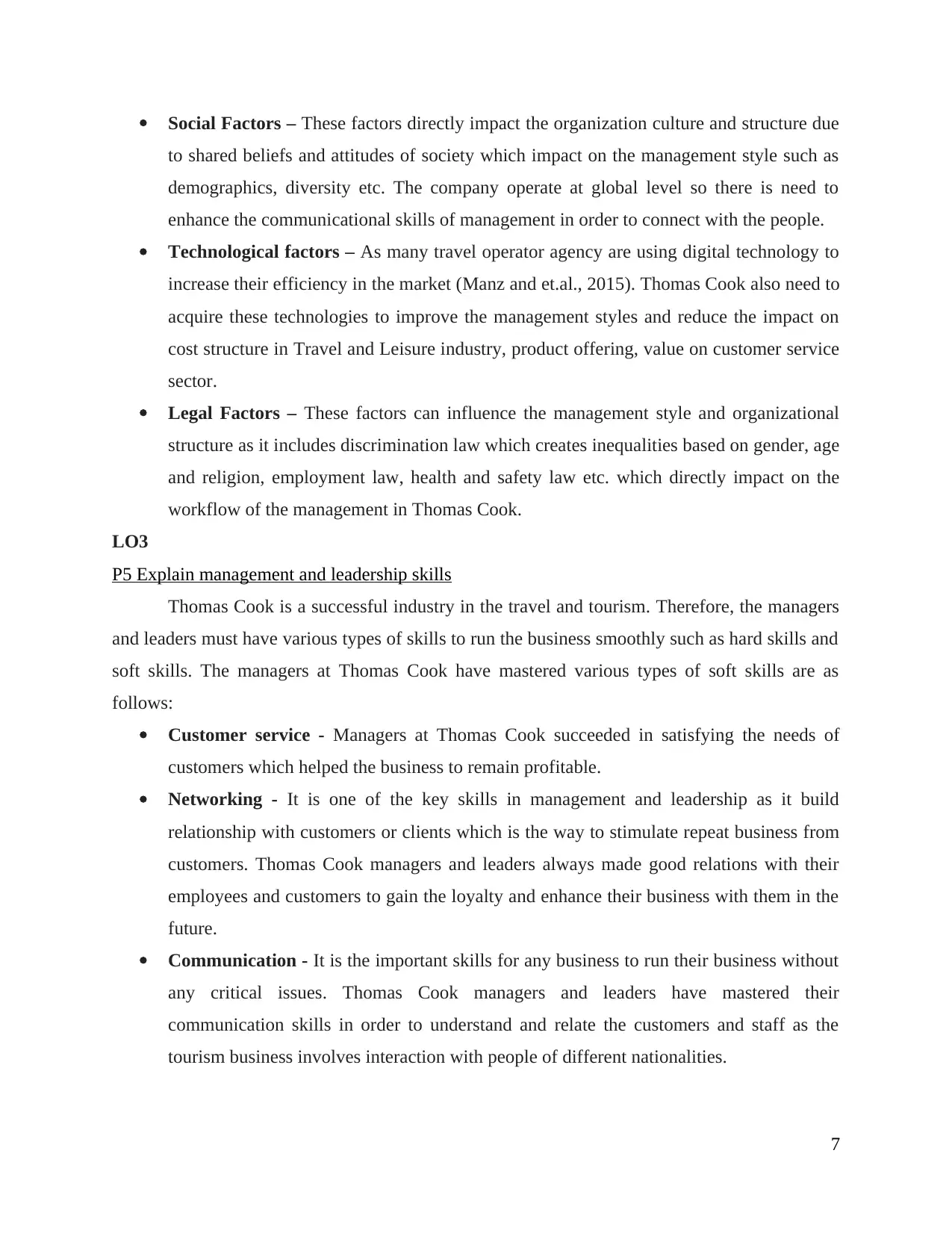
Social Factors – These factors directly impact the organization culture and structure due
to shared beliefs and attitudes of society which impact on the management style such as
demographics, diversity etc. The company operate at global level so there is need to
enhance the communicational skills of management in order to connect with the people.
Technological factors – As many travel operator agency are using digital technology to
increase their efficiency in the market (Manz and et.al., 2015). Thomas Cook also need to
acquire these technologies to improve the management styles and reduce the impact on
cost structure in Travel and Leisure industry, product offering, value on customer service
sector.
Legal Factors – These factors can influence the management style and organizational
structure as it includes discrimination law which creates inequalities based on gender, age
and religion, employment law, health and safety law etc. which directly impact on the
workflow of the management in Thomas Cook.
LO3
P5 Explain management and leadership skills
Thomas Cook is a successful industry in the travel and tourism. Therefore, the managers
and leaders must have various types of skills to run the business smoothly such as hard skills and
soft skills. The managers at Thomas Cook have mastered various types of soft skills are as
follows:
Customer service - Managers at Thomas Cook succeeded in satisfying the needs of
customers which helped the business to remain profitable.
Networking - It is one of the key skills in management and leadership as it build
relationship with customers or clients which is the way to stimulate repeat business from
customers. Thomas Cook managers and leaders always made good relations with their
employees and customers to gain the loyalty and enhance their business with them in the
future.
Communication - It is the important skills for any business to run their business without
any critical issues. Thomas Cook managers and leaders have mastered their
communication skills in order to understand and relate the customers and staff as the
tourism business involves interaction with people of different nationalities.
7
to shared beliefs and attitudes of society which impact on the management style such as
demographics, diversity etc. The company operate at global level so there is need to
enhance the communicational skills of management in order to connect with the people.
Technological factors – As many travel operator agency are using digital technology to
increase their efficiency in the market (Manz and et.al., 2015). Thomas Cook also need to
acquire these technologies to improve the management styles and reduce the impact on
cost structure in Travel and Leisure industry, product offering, value on customer service
sector.
Legal Factors – These factors can influence the management style and organizational
structure as it includes discrimination law which creates inequalities based on gender, age
and religion, employment law, health and safety law etc. which directly impact on the
workflow of the management in Thomas Cook.
LO3
P5 Explain management and leadership skills
Thomas Cook is a successful industry in the travel and tourism. Therefore, the managers
and leaders must have various types of skills to run the business smoothly such as hard skills and
soft skills. The managers at Thomas Cook have mastered various types of soft skills are as
follows:
Customer service - Managers at Thomas Cook succeeded in satisfying the needs of
customers which helped the business to remain profitable.
Networking - It is one of the key skills in management and leadership as it build
relationship with customers or clients which is the way to stimulate repeat business from
customers. Thomas Cook managers and leaders always made good relations with their
employees and customers to gain the loyalty and enhance their business with them in the
future.
Communication - It is the important skills for any business to run their business without
any critical issues. Thomas Cook managers and leaders have mastered their
communication skills in order to understand and relate the customers and staff as the
tourism business involves interaction with people of different nationalities.
7
⊘ This is a preview!⊘
Do you want full access?
Subscribe today to unlock all pages.

Trusted by 1+ million students worldwide
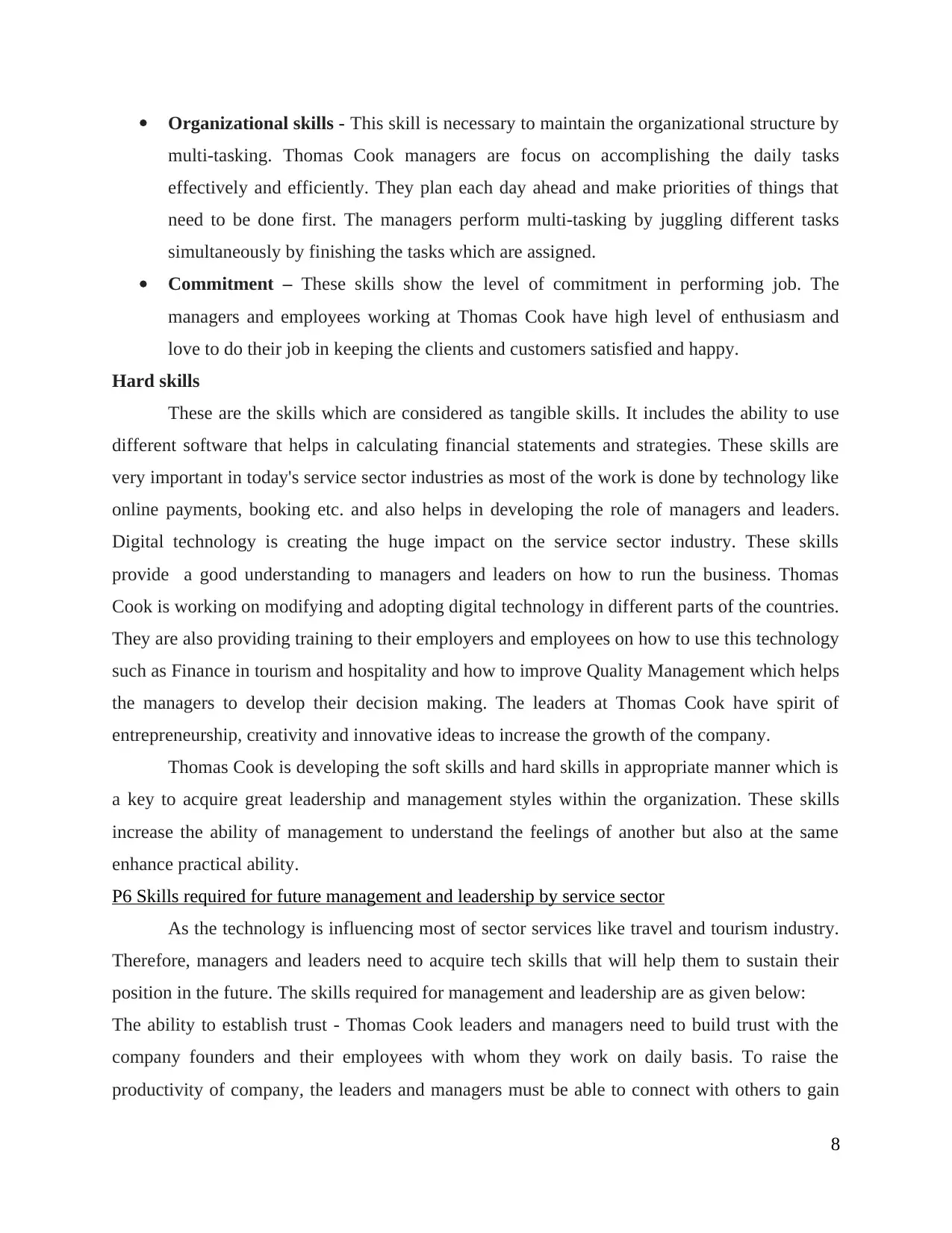
Organizational skills - This skill is necessary to maintain the organizational structure by
multi-tasking. Thomas Cook managers are focus on accomplishing the daily tasks
effectively and efficiently. They plan each day ahead and make priorities of things that
need to be done first. The managers perform multi-tasking by juggling different tasks
simultaneously by finishing the tasks which are assigned.
Commitment – These skills show the level of commitment in performing job. The
managers and employees working at Thomas Cook have high level of enthusiasm and
love to do their job in keeping the clients and customers satisfied and happy.
Hard skills
These are the skills which are considered as tangible skills. It includes the ability to use
different software that helps in calculating financial statements and strategies. These skills are
very important in today's service sector industries as most of the work is done by technology like
online payments, booking etc. and also helps in developing the role of managers and leaders.
Digital technology is creating the huge impact on the service sector industry. These skills
provide a good understanding to managers and leaders on how to run the business. Thomas
Cook is working on modifying and adopting digital technology in different parts of the countries.
They are also providing training to their employers and employees on how to use this technology
such as Finance in tourism and hospitality and how to improve Quality Management which helps
the managers to develop their decision making. The leaders at Thomas Cook have spirit of
entrepreneurship, creativity and innovative ideas to increase the growth of the company.
Thomas Cook is developing the soft skills and hard skills in appropriate manner which is
a key to acquire great leadership and management styles within the organization. These skills
increase the ability of management to understand the feelings of another but also at the same
enhance practical ability.
P6 Skills required for future management and leadership by service sector
As the technology is influencing most of sector services like travel and tourism industry.
Therefore, managers and leaders need to acquire tech skills that will help them to sustain their
position in the future. The skills required for management and leadership are as given below:
The ability to establish trust - Thomas Cook leaders and managers need to build trust with the
company founders and their employees with whom they work on daily basis. To raise the
productivity of company, the leaders and managers must be able to connect with others to gain
8
multi-tasking. Thomas Cook managers are focus on accomplishing the daily tasks
effectively and efficiently. They plan each day ahead and make priorities of things that
need to be done first. The managers perform multi-tasking by juggling different tasks
simultaneously by finishing the tasks which are assigned.
Commitment – These skills show the level of commitment in performing job. The
managers and employees working at Thomas Cook have high level of enthusiasm and
love to do their job in keeping the clients and customers satisfied and happy.
Hard skills
These are the skills which are considered as tangible skills. It includes the ability to use
different software that helps in calculating financial statements and strategies. These skills are
very important in today's service sector industries as most of the work is done by technology like
online payments, booking etc. and also helps in developing the role of managers and leaders.
Digital technology is creating the huge impact on the service sector industry. These skills
provide a good understanding to managers and leaders on how to run the business. Thomas
Cook is working on modifying and adopting digital technology in different parts of the countries.
They are also providing training to their employers and employees on how to use this technology
such as Finance in tourism and hospitality and how to improve Quality Management which helps
the managers to develop their decision making. The leaders at Thomas Cook have spirit of
entrepreneurship, creativity and innovative ideas to increase the growth of the company.
Thomas Cook is developing the soft skills and hard skills in appropriate manner which is
a key to acquire great leadership and management styles within the organization. These skills
increase the ability of management to understand the feelings of another but also at the same
enhance practical ability.
P6 Skills required for future management and leadership by service sector
As the technology is influencing most of sector services like travel and tourism industry.
Therefore, managers and leaders need to acquire tech skills that will help them to sustain their
position in the future. The skills required for management and leadership are as given below:
The ability to establish trust - Thomas Cook leaders and managers need to build trust with the
company founders and their employees with whom they work on daily basis. To raise the
productivity of company, the leaders and managers must be able to connect with others to gain
8
Paraphrase This Document
Need a fresh take? Get an instant paraphrase of this document with our AI Paraphraser
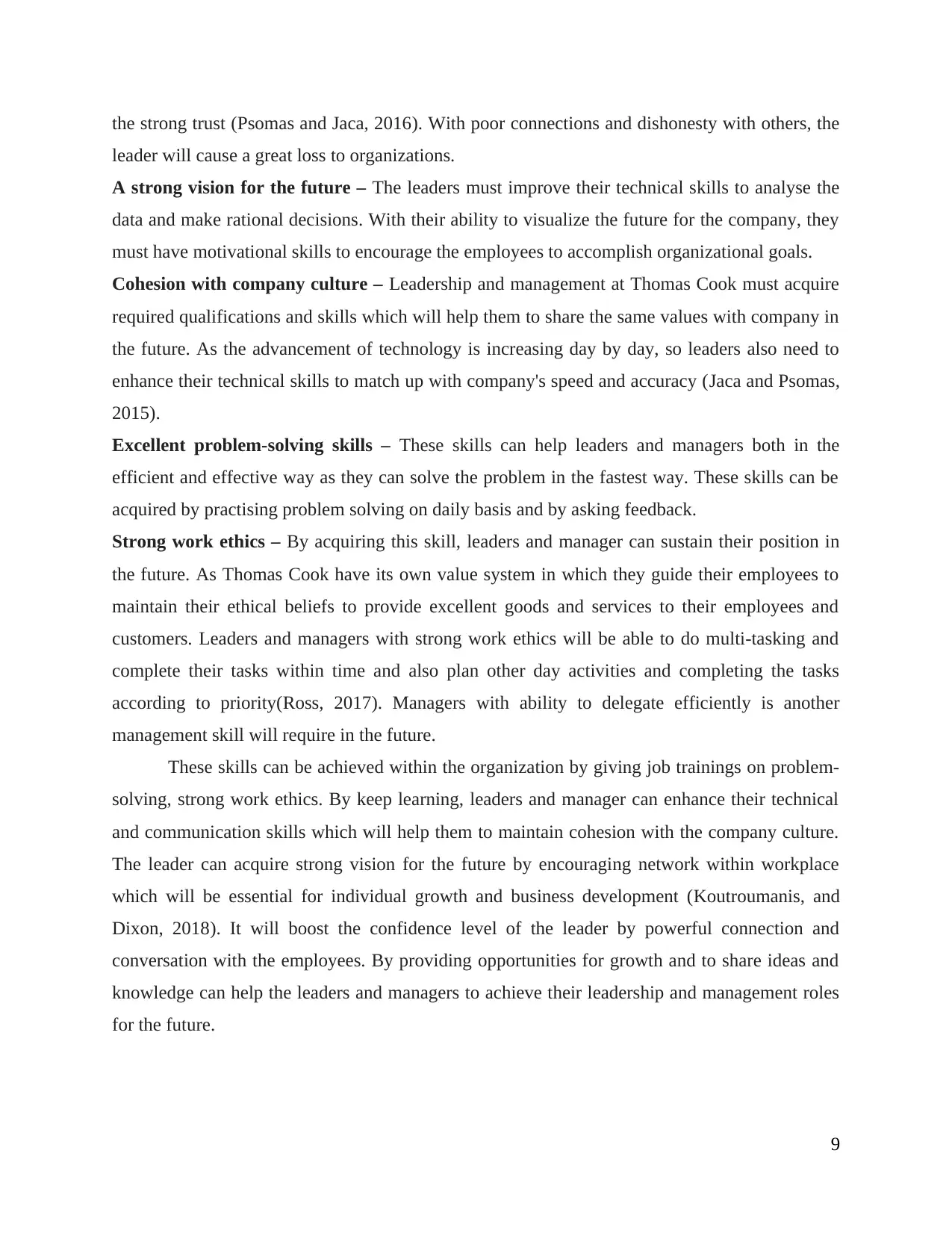
the strong trust (Psomas and Jaca, 2016). With poor connections and dishonesty with others, the
leader will cause a great loss to organizations.
A strong vision for the future – The leaders must improve their technical skills to analyse the
data and make rational decisions. With their ability to visualize the future for the company, they
must have motivational skills to encourage the employees to accomplish organizational goals.
Cohesion with company culture – Leadership and management at Thomas Cook must acquire
required qualifications and skills which will help them to share the same values with company in
the future. As the advancement of technology is increasing day by day, so leaders also need to
enhance their technical skills to match up with company's speed and accuracy (Jaca and Psomas,
2015).
Excellent problem-solving skills – These skills can help leaders and managers both in the
efficient and effective way as they can solve the problem in the fastest way. These skills can be
acquired by practising problem solving on daily basis and by asking feedback.
Strong work ethics – By acquiring this skill, leaders and manager can sustain their position in
the future. As Thomas Cook have its own value system in which they guide their employees to
maintain their ethical beliefs to provide excellent goods and services to their employees and
customers. Leaders and managers with strong work ethics will be able to do multi-tasking and
complete their tasks within time and also plan other day activities and completing the tasks
according to priority(Ross, 2017). Managers with ability to delegate efficiently is another
management skill will require in the future.
These skills can be achieved within the organization by giving job trainings on problem-
solving, strong work ethics. By keep learning, leaders and manager can enhance their technical
and communication skills which will help them to maintain cohesion with the company culture.
The leader can acquire strong vision for the future by encouraging network within workplace
which will be essential for individual growth and business development (Koutroumanis, and
Dixon, 2018). It will boost the confidence level of the leader by powerful connection and
conversation with the employees. By providing opportunities for growth and to share ideas and
knowledge can help the leaders and managers to achieve their leadership and management roles
for the future.
9
leader will cause a great loss to organizations.
A strong vision for the future – The leaders must improve their technical skills to analyse the
data and make rational decisions. With their ability to visualize the future for the company, they
must have motivational skills to encourage the employees to accomplish organizational goals.
Cohesion with company culture – Leadership and management at Thomas Cook must acquire
required qualifications and skills which will help them to share the same values with company in
the future. As the advancement of technology is increasing day by day, so leaders also need to
enhance their technical skills to match up with company's speed and accuracy (Jaca and Psomas,
2015).
Excellent problem-solving skills – These skills can help leaders and managers both in the
efficient and effective way as they can solve the problem in the fastest way. These skills can be
acquired by practising problem solving on daily basis and by asking feedback.
Strong work ethics – By acquiring this skill, leaders and manager can sustain their position in
the future. As Thomas Cook have its own value system in which they guide their employees to
maintain their ethical beliefs to provide excellent goods and services to their employees and
customers. Leaders and managers with strong work ethics will be able to do multi-tasking and
complete their tasks within time and also plan other day activities and completing the tasks
according to priority(Ross, 2017). Managers with ability to delegate efficiently is another
management skill will require in the future.
These skills can be achieved within the organization by giving job trainings on problem-
solving, strong work ethics. By keep learning, leaders and manager can enhance their technical
and communication skills which will help them to maintain cohesion with the company culture.
The leader can acquire strong vision for the future by encouraging network within workplace
which will be essential for individual growth and business development (Koutroumanis, and
Dixon, 2018). It will boost the confidence level of the leader by powerful connection and
conversation with the employees. By providing opportunities for growth and to share ideas and
knowledge can help the leaders and managers to achieve their leadership and management roles
for the future.
9
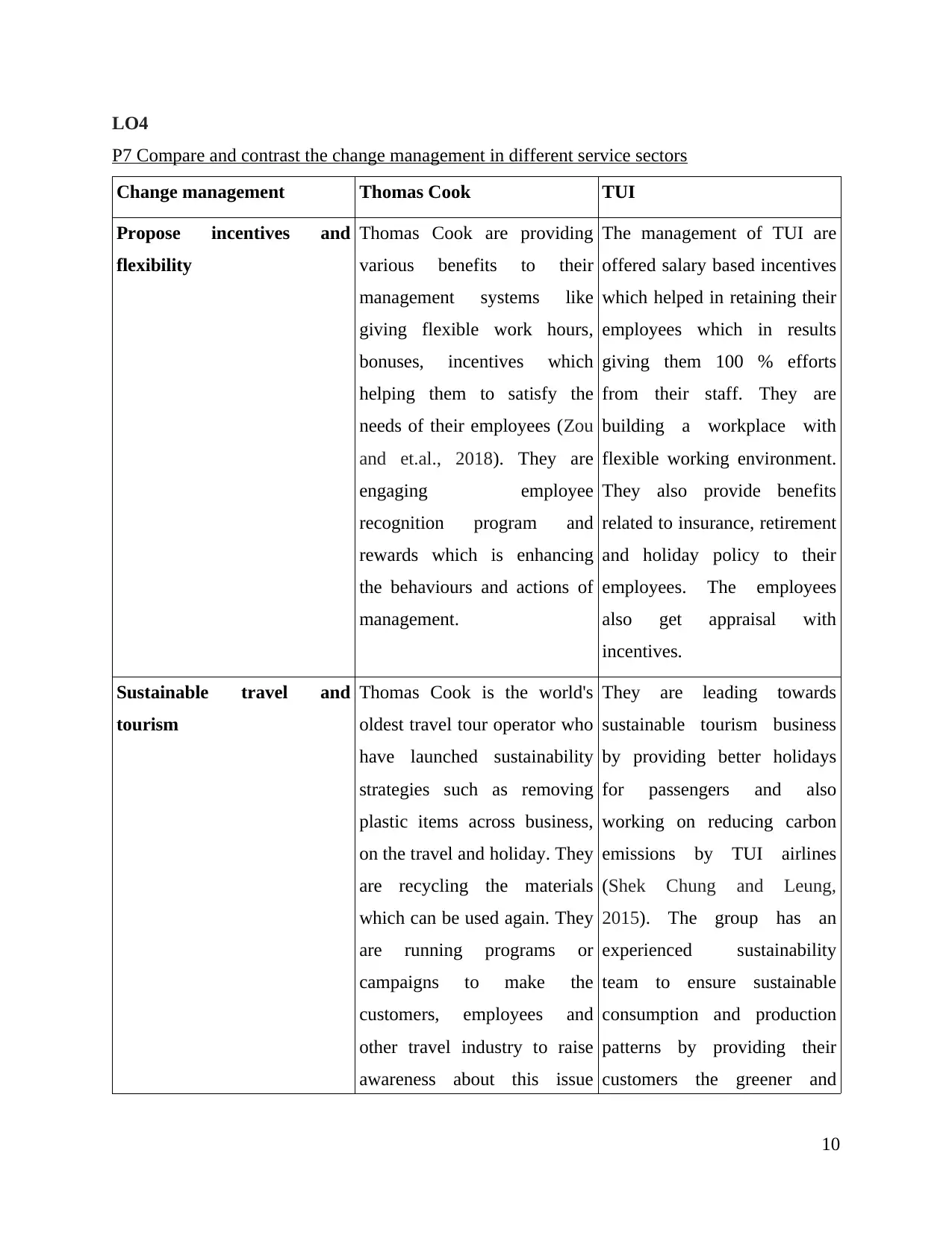
LO4
P7 Compare and contrast the change management in different service sectors
Change management Thomas Cook TUI
Propose incentives and
flexibility
Thomas Cook are providing
various benefits to their
management systems like
giving flexible work hours,
bonuses, incentives which
helping them to satisfy the
needs of their employees (Zou
and et.al., 2018). They are
engaging employee
recognition program and
rewards which is enhancing
the behaviours and actions of
management.
The management of TUI are
offered salary based incentives
which helped in retaining their
employees which in results
giving them 100 % efforts
from their staff. They are
building a workplace with
flexible working environment.
They also provide benefits
related to insurance, retirement
and holiday policy to their
employees. The employees
also get appraisal with
incentives.
Sustainable travel and
tourism
Thomas Cook is the world's
oldest travel tour operator who
have launched sustainability
strategies such as removing
plastic items across business,
on the travel and holiday. They
are recycling the materials
which can be used again. They
are running programs or
campaigns to make the
customers, employees and
other travel industry to raise
awareness about this issue
They are leading towards
sustainable tourism business
by providing better holidays
for passengers and also
working on reducing carbon
emissions by TUI airlines
(Shek Chung and Leung,
2015). The group has an
experienced sustainability
team to ensure sustainable
consumption and production
patterns by providing their
customers the greener and
10
P7 Compare and contrast the change management in different service sectors
Change management Thomas Cook TUI
Propose incentives and
flexibility
Thomas Cook are providing
various benefits to their
management systems like
giving flexible work hours,
bonuses, incentives which
helping them to satisfy the
needs of their employees (Zou
and et.al., 2018). They are
engaging employee
recognition program and
rewards which is enhancing
the behaviours and actions of
management.
The management of TUI are
offered salary based incentives
which helped in retaining their
employees which in results
giving them 100 % efforts
from their staff. They are
building a workplace with
flexible working environment.
They also provide benefits
related to insurance, retirement
and holiday policy to their
employees. The employees
also get appraisal with
incentives.
Sustainable travel and
tourism
Thomas Cook is the world's
oldest travel tour operator who
have launched sustainability
strategies such as removing
plastic items across business,
on the travel and holiday. They
are recycling the materials
which can be used again. They
are running programs or
campaigns to make the
customers, employees and
other travel industry to raise
awareness about this issue
They are leading towards
sustainable tourism business
by providing better holidays
for passengers and also
working on reducing carbon
emissions by TUI airlines
(Shek Chung and Leung,
2015). The group has an
experienced sustainability
team to ensure sustainable
consumption and production
patterns by providing their
customers the greener and
10
⊘ This is a preview!⊘
Do you want full access?
Subscribe today to unlock all pages.

Trusted by 1+ million students worldwide
1 out of 16
Related Documents
Your All-in-One AI-Powered Toolkit for Academic Success.
+13062052269
info@desklib.com
Available 24*7 on WhatsApp / Email
![[object Object]](/_next/static/media/star-bottom.7253800d.svg)
Unlock your academic potential
Copyright © 2020–2026 A2Z Services. All Rights Reserved. Developed and managed by ZUCOL.



